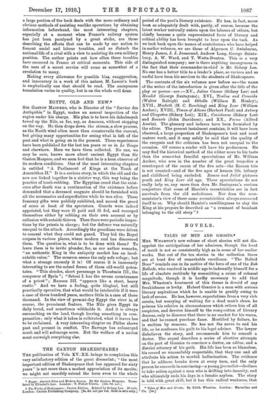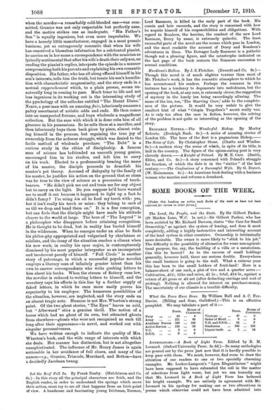NOVELS.
TALES OF MEN AND GHOSTS.*
Mits. Wriawroles new volume of short shories will not dis- appoint the anticipations of her admirers, though the level of merit is not so consistently high as in some of her earlier works. But out of the ten stories in the collection there are at least five of remarkable excellence. "The Bolted Door" reminds one in its motive of the hero of one of the Bali Ballads, who resolved in middle age to indemnify himself for a life of absolute rectitude by committing a crime of colossal magnitude, though it is hardly necessary to add that Mrs. Wharton's treatment of this theme is devoid of any freakishness or levity. Hubert Graniee is a man with seriotui literary aspirations which he is unable to gratify owing to lack of means. He has, however, expectations from a very rich cousin, but wearying of waiting for a dead man's shoes, he poisons his relative in circumstances which relieve him of all suspicion, and devotes himself to the composition of literary dramas, only to discover that there is no market for his wares, and that he cannot purchase fame. Mortified by failure, he is smitten by remorse. He has not the nerve to and his life, so he confesses his guilt to his legal adviser. The lawyer disbelieves the story, and recommends him to consult a doctor. The sequel describes a series of abortive attempts on the part of Granice to convince a doctor, an editor, and a district attorney of his guilt. His life has been so blameless, his record so unassailably respectable, that they one and all attribute his action to morbid hallucination. The evidence that he adduces breaks down at every turn, and the only person he succeeds in convincing—a young journalist—declines to take action against a man who is drifting into insanity, and who ultimately ends his days in a lunatic asylum. The story is told with great skill, but it has this radical weakness, that * Tales of Men and Ghosts. By Edith Wharton. London: Macmillan and Co. [65.] when the murder—a remarkably cold-blooded one—was com- mitted, Granice was not only respectable but perfectly sane, and the motive strikes one as inadequate. "His Father's Son" is equally ingenious, but even more improbable. We have a homely little manufacturer, engaged in a most prosaic business, yet so outrageously romantic that when his wife has conceived a blameless infatuation for a celebrated pianist, he carries on in her name a correspondence with the musician so lyrically sentimental that after his wife's death their only son, on reading the pianist's replies, interprets the episode in a manner compromising both his parents and explaining his own romantic disposition. His father, who has all along effaced himself in his son's interests, tells him the truth, but treats his son's humilia- tion with characteristic magnanimity, and the story ends in a mutual rapprochement which, to a plain person, seems un- naturally long in coming to pass. Much truer to life and not less ingenious in its working out is the interesting study of the pyschology of the collector entitled "The Daunt Diana." Neave, a poor man with an amazing flair, laboriously amasses a paltry assortment of artistic odds and ends. He then comes into an unexpected fortune, and buys wholesale a magnificent collection. But the ease with which it is done robs him of all pleasure in his possessions. So he sells them at a sacrifice, and then laboriously buys them back piece by piece, almost ruin- ing himself in the process, but regaining the true joy of ownership from the arduous struggle, which was denied to the facile method of wholesale purchase. "The Debt" is a curious study in the ethics of discipleship. A famous man of science has befriended an uncouth young genius, encouraged him in his studies, and left him to carry on his work. Elected to a professorship bearing the name of his master, the disciple proceeds to demolish his master's pet theory. Accused of disloyalty by the family of his master, he justifies his action on the ground that so alone was he true to the view of science as a procession of torch- bearers. "He didn't pick me out and train me for any object but to carry on the light. Do you suppose he'd have wanted me to snuff it out because it happened to light up a fact he didn't fancy ? I'm using his oil to feed my torch with : yes, but it isn't really his torch or mine : they belong to each of us till we drop and hand them on." It is a fine conception, but one feels that the disciple might have made his attitude clearer to the world at large. The hero of "The Legend" is a philosopher who disappears before attaining recognition. He is thought to be dead, but in reality has buried himself in the wilderness. When he emerges under an alias he finds his philosophy appropriated and vulgarised by charlatans or sciolists, and the irony of the situation reaches a climax when his new work, in reality his opus majus, is contemptuously dismissed by his most popular interpreter as an incompetent and incoherent parody of himself. "Full Circle" is another story of patronage, in which a successful popular novelist employs a literary man of infinitely greater talent than his own to answer correspondents who write gushing letters to him about his books. When the stream of flattery runs low, the novelist is reduced to writing letters to himself, and the secretary caps his efforts in this line by a further supply of faked letters, in which he once more easily proves his superiority to his employer. The humorous possibilities of the situation, however, are neglected, and the story ends on an almost tragic note. Humour is not Mrs. Wharton's strong point. Of the two ghost stories, "The Eyes" leaves us cold, but " Afterward " stirs a genuine thrill. The notion of a house which had no ghost of its own, but attracted ghosts from elsewhere—ghosts who were not recognised as such till long after their appearance—is novel, and worked out with singular persuasiveness.
We have written enough to indicate the quality of Mrs. Wharton's book, and the wide range of interests with which she deals. Her manner has distinction, but is not altogether unsophisticated. The influence of Mr. Henry James is again noticeable in her avoidance of full closes, and many of the names—e.g., Granice, Trim mile, Murchard, and Betton—have a decidedly Jacobean twang.























































 Previous page
Previous page